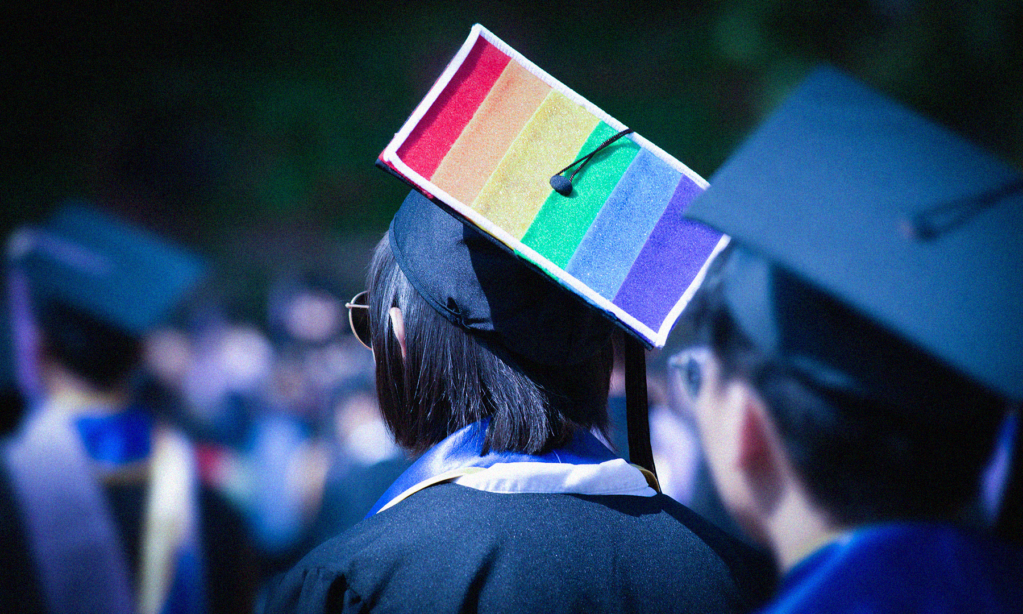In the sleepy days before the beginning of the school year, the Government of Saskatchewan quietly made an announcement with significant ramifications. It would require schools to seek permission from the parent or guardian to change the child's pronouns and preferred name, if that student is under 16 years old—effectively outing students to their parents, and potentially forcing some 2SLGBTQ+ students with unsupportive families back into the closet.
Another change, announced simultaneously, was that schools must now inform parents about the contents of sex education curricula, and allow those parents to pull their children out of the course—which may strike Ontario parents as deja vu.
Saskatchewan isn’t the first province to use “parental choice” to justify attacks on queer youth. Prior to being elected as premier of Alberta, Jason Kenney ran on a platform of alerting parents if their child was joining a gay-straight alliance. New Brunswick has also announced a policy requiring schools inform parents if their under-16 child requests to change their pronouns.
Ontario Education Minister Stephen Lecce said that the province’s position was that parents should be “fully involved” in their child’s decision to use a different pronoun at school. Manitoba Premier Heather Stefanson has promised to “fight for enhanced parental rights” if re-elected. And federal Conservative leader Pierre Poilievre has also raised the issue, saying that schools should “teach the basics” and “leave conversations about LGBTQ issues to parents.”
These statements and legislation juxtapose the rights, privacy and safety of already-vulnerable kids against a much more amorphous claim: a parent’s so-called “right to know”. They don’t prioritize the school’s responsibility to provide those kids with safety and support – and they should – and the public funding and resources required to do so.
To be clear, this isn’t about keeping things from parents—it’s about honouring the right of kids to tell their parents something deeply personal when they’re ready, and protecting kids who may never feel safe doing so for very good reasons. Who takes precedence? Parents who feel they have a right to know, or kids who may be at risk when something is disclosed against their wishes?
Parental choice: weaponizing the education debates
When politicians or lobby groups want to provide a constituency with a very potent rallying point (or target), few vehicles are as effective as public education. Everyone has an opinion on it. It involves children, parents, and staff. It’s funded out of tax dollars which also conveniently allows for claims of “agents of the state” or “government schools.” And, in this case, the addition of sexuality and gender identity compounds the sense of “moral panic” as evidenced by Save the Children/ Protect Families/ Leave our Kids Alone slogans.
The parental choice debate is loaded with assumptions and insinuations—a fundamental distrust of educators, the absurd idea that there’s a war on parents, or that kids are being nefariously influenced (not simply growing up, experiencing the world around them and becoming more self-aware). It ignores the clear impact this would have on some of the most vulnerable kids—who may face real danger if their pronouns or gender identity are forcibly revealed.
When decision-makers simplistically frame children’s issues as a question about who should be ‘in control’—parents or public institutions—it immediately becomes extremely divisive. This is a deliberate strategy to weaponize parental anxiety about a loss or lack of control over any number of things in their lives, but focuses on their children. It panders to a vocal constituency, vilifies a particularly vulnerable group of kids, and scapegoats the educators who teach and support them.
In this instance, the narrative of “parental choice” speaks to a segment of society that feels their “natural” authority – usually based on longstanding notions of who ‘should’ be in charge – is being challenged. It undermines or casts suspicion on a workforce of mostly women, and a sector that is notoriously underfunded. And it positions kids, their evolving political and social agency, and how we care for them throughout this process as a political wedge issue.
The current debate reframes the very normal maturing process where kids start to make their own decisions—and the normal process parents go through to accept that—as abnormal or nefarious. It continues to cast suspicion on public sector workers for their proximity to kids and the professional guidance and support they provide. And it gives tacit endorsement to the continued targeting of the 2SLGBTQ+ community, in and out of school.
Sadly, the suggestion that children are being manipulated through the public education system isn’t new. But instead of simply accepting this political argument as “common sense,” we need to ask some questions.
Who’s being scapegoated? Who’s being targeted? Does this narrative elicit a deeply personal response from people who don’t usually get involved politically? Have you heard this message before? Does it distract from other key issues—collective bargaining, a government scandal—or is it part of a campaign strategy to engage and grow a political base? Is this about rights and responsibility, or is it about fear and control?
Parental choice: another play to privatize public education
The strategy of scapegoating public schools and educators has also been instrumental in fuelling privatization initiatives in education. Some parents, afraid of what public schools represent (or how they’ve been maligned), demand—and in some provinces receive—public money to facilitate going to ideologically aligned private schools. It’s an individualized approach to both paying for and providing an education that doesn’t cause discomfort, that won’t raise difficult questions or challenge so-called ‘natural' authority and traditional power structures the way the public system is accused of doing.
To be clear, of course parents should have a role in their child’s education. If they’re curious about what’s being taught, they can access and read the curriculum and not rely on partial truths or torqued commentary. They can talk to their kid’s teachers. They can raise concerns and talk to the principal. They can go to school council meetings. But not all parents can do this easily, or feel welcomed in doing so.
Part of the problem is that some parents and some communities can find it challenging to communicate openly or effectively with their kid’s school or educator—for reasons that are often structural or even because of funding cuts. But unacknowledged or left unaddressed, that sense of “not knowing” can be weaponized by campaigns such as these.
At its best, public education is about learning about concepts and each other and respecting differences while bridging divides. Parental choice rhetoric and the legislation it underpins only obscures the bigger issue—do schools have the funding and resources they need to educate, support and inspire all kids, and develop engaged relationships with the broader school community?
Ultimately, these attacks are about dismantling public education—a movement away from publicly provided to publicly funded, from publicly accountable to privately determined and consumed. It’s the worst manifestation of populism because it’s not about building on what we have in common and learning from each other—including addressing legitimate concerns with an increasingly underfunded public education system—but instead motivates us to retreat to what we know, and who we know. And, particularly cynically, it is prepared to treat an already vulnerable community as collateral damage.







